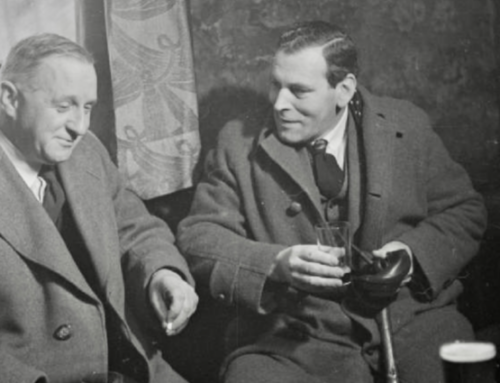Imaginative Conservative Readers, considering how much we revere Burke here, I thought it might be good to reprint the following two pieces from him. While I knew he and Adam Smith were close friends, I did not realize until yesterday (February 19, 2012) that he had briefly reviewed each of Smith’s major works. Burke’s words are, sadly, not lengthy, as he believed a book review should print as much as possible from the book reviewed. Regardless, I find these fascinating. I hope you do as well. Yours, Brad Birzer
***
It is very difficult, if not impossible, consistently with the brevity of our design, to give the reader a proper idea of this excellent work. A dry abstract of the system would convey no juster idea of it, than the skeleton of a departed beauty would of her form when she was alive; at the same time the work is so well methodified, the parts grow so naturally and gracefully out of reach other that it would be doing it equal injustice to shew it by broken and detached pieces.
There will, in a work of this kind, always be great deficiencies; but we are far from professing to make our accounts stand to the reader in the place of the books on which we remark. Had we thought that this is any degree would happen, as should certainly think ourselves obliged totally to omit this article in the Register, as it would be an effect the farthest in the world from our design, which is in the strongest manner to recommend to the attention of our readers, some of these books which we think deserving of it; we shoes none which we cannot recommend; we give our judgment with candour and impartiality; but never aiming to impose our opinions dogmatically on the public, we think it but justice to the authors and the readers, to give some specimen, however imperfect, of each writer’s way of thinking and expression. We mean to raise, not to satisfy curiosity. There have been of late many books written on our moral duties, and our moral sensations. One would have thought the matter had been exhausted. But this author has struck out a new, and at the same time a perfectly natural road of speculation on this subject. Had it been only an ingenious novelety on any other subject, it might have been praised; but with regard to morals, nothing could be more dangerous. We conceive, that here the theory is in all its essential parts just, and founded on truth and nature. The author seeks for the foundation of the just, the fit, the proper, the decent, in our most common and most allowed passions; and making approbation and disapprobation the tests of virtue and vice, and shewing that those are founded on sympathy, he raises from this simple truth, one of the most beautiful fabrics of moral theory, that has perhaps ever appeared. The illustrations are numerous and happy, and shew the author to be a man of uncommon observation. His language is easy and spirited, and puts things before you in the fullest light; it is rather painting than writing. . . . [huge chunk of Theory of Moral Sentiments reprinted]
—Edmund Burke, review of Adam Smith, Theory of Moral Sentiments, Annual Register 2 (1759): 484-489.
***
The growth and decay of nations have frequently afforded topics of admiration and complaint to the moralist and declaimer: they have sometimes exercised the speculations of the politician; but they have seldom been considered in all their causes and combinations by the philosopher. The French economical writers undoubtedly have their merits. Within this century they have open the ways to a rational theory, on the subjects of agriculture, manufactures, and commerce. But no one work has appeared amongst them, nor perhaps could there be collected from the whole together, anything to be compared to the present performance, for sagacity and penetration of mine, extensive use, accurate distinction, just and natural connection, independence of parts. It is a complete analysis of society, beginning with the 1st rudiments of the simplest manual labor, and rising by an easy natural predation to the highest attainments of mental powers. In which course not only arts and commerce, but finance, justice, public police, the economy of armies, and the system of education, are considered and argued upon, often profoundly, always plausibly and clearly; many of the speculations are new, and time will be required before a certain judgment can be passed on their truth and solidity. The style of the author maybe sometimes thought difficult, but it must be remembered that the work is didactic, that the author means to teach, and teach things that are by no means obvious. We cannot better state the nature and plan of his work, than by laying before the reader the doctor’s own very short introduction.
The annual labor of every nation is the fund which originally supplies it with all the necessaries and conveniences of life which it annually consumes, and which consists always, either in the immediate produce of that labor, or in what is purchased with that produce from other nations. According, therefore, as this produce, or what is purchased with it, there’s a greater or smaller proportion to the number of those who are to consume it, the nation will be better or worse supplied with all the necessaries and conveniences for which it has occasion. But this proportion must in every nation be regulated by two different circumstances: 1st, by the skill, dexterity, and judgment, with which labor is generally supplied and it; and, secondly, by the proportion between the number of those who were employed in useful labor, and that of those who were not so employed. What ever be the soil, climate, or extent the territory of any particular nation, the abundance or scant keenness of its annual supply must, in that particular situation, depend upon those two circumstances. The abundance or scant keenness of this supply to seems to depend more upon the former of those two circumstances than upon the latter. Among the savage nations of hunters and fishers, every individual who is able to work, is more or less employed in useful labor, and endeavors to provide, as well as he can, the necessaries and the conveniences of life for himself, and such of his family or tribe as are either too old, or too young, or too infirm, to go hunting and fishing. . . . [The rest is a quote from Wealth of Nations.].
–Edmund Burke, review of Adam Smith, An Enquiry into the Nature and Causes of the Wealth of Nations, Annual Register 19 (1776), 241.
***
And, an added benefit: Burke’s letter to Adam Smith, dated September 10, 1759, as printed in the Liberty Fund edition of Correspondence of Adam Smith, pp. 46-47.
“I am quite ashamed that the first letter I have the honour of writing to you should be an apology for my conduct. It ought to be entirely taken up with my thanks to you for the satisfaction I received from your very agreeable and instructive work, but I cannot do that pleasing act of Justice without apologizing at the same time for not having done it much earlier. When I received the Theory of Moral of Sentiments from Mr. Hume, I ran through it with great eagerness; I was immediately after hurried out of Town, and involved ever since in a Variety of troublesome affairs. My resolution was to defer my acknowledgments until I had read your book with proper care and attention; to do otherwise with so well studied a piece would be to treat it with great injustice. It was indeed an attention extremely well bestowed and abundantly repaid. I am not only pleased with the ingenuity of your Theory; I am convinced of its solidity and Truth; and I do not know that it ever cost me less trouble to admit so many things to which I had been a stranger before. I have ever thought that the old Systems of morality were too contracted and that this Science could never stand well upon any narrower Basis than the whole of Human Nature. All the writers who treated this Subject before you were like those Gothic Architects who were fond of turning great Faults upon a single slender Pillar; there is an art in this, and there is a degree of ingenuity without doubt; but it is not sensible, and it cannot long be pleasing. A theory like yours founded on the Nature of man, which is always the same, will last, when those that are founded on his opinions, which are always changing, will and must be forgotten. I own I am particularly pleased with those easy and happy illustrations from common Life and manners in which your work abounds more than any other that I know by far. They are indeed the fittest to explain those natural movements of the mind with which every Science relating to our Nature ought to begin. But one sees, that nothing is less used, then what lies directly in our way. Philosophers therefore very frequently miss a thousand things that might be of infinite advantage,… It seems to require that infantine simplicity which despises nothing, to make a good Philosopher, as well is to make a good Christian. Besides so much a powerful reasoning as your Book contains, there is so much elegant Painting of the manners and passions, that it is highly valuable even on that account. The style is everywhere lively and elegant, and what is, I think equally important in the work of that kind, is it is well varied; it is often sublime too, particularly in that fine Picture of the stoic Philosophy towards the end of your first part which is dressed out in all the grandeur and Pomp that becomes that magnificent delusion. I have mentioned something of what affected me as Beauties in your work. I will take the Liberty to mention to what appeared to me as a sort of Fault. You are in some few places, what Mr. Locke is in most of his writings, rather a little too diffuse. This is however a fault of the generous kind, and infinitely preferable to the dry sterile manner, which those of dull imaginations are apt to fall into. To another I should apologize for a freedom of this Nature. My delay on this occasion may I am afraid make it improper for me to ask any favour from you. But there is one, I have too much at heart not to sacrifice any propriety to attain it. It is, that whenever you come to Town, I may have the honor of being made personally known to you. I shall take the Liberty of putting this office on our friend Mr. Hume who has already so much obliged me by giving me your book. I am Sir with the truest esteem for your Work and your character.”
The Imaginative Conservative applies the principle of appreciation to the discussion of culture and politics—we approach dialogue with magnanimity rather than with mere civility. Will you help us remain a refreshing oasis in the increasingly contentious arena of modern discourse? Please consider donating now.








Leave A Comment